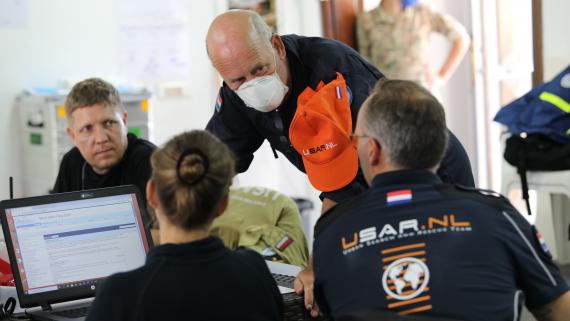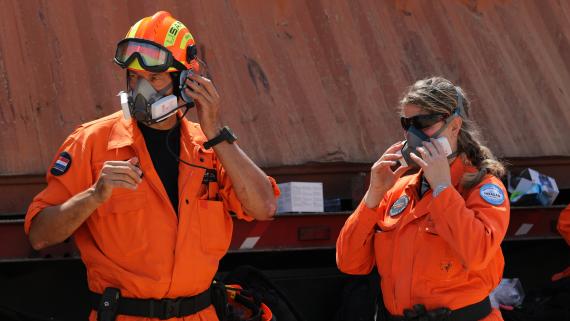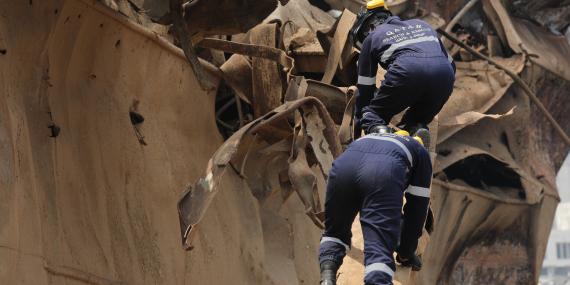Beirut, Lebanon
Following the explosions at the Beirut port, a 19-member UNDAC team and 13 USAR teams from 10 countries deployed immediately following the request from the Government and the Humanitarian Coordinator. The first INSARAG team arrived 24 hours after the explosions. OCHA
Since the outbreak of COVID-19, international emergency responders around the world have prepared to respond to shocks occurring during the pandemic. It has not been a question of “if” but “when” a major natural or human-made disaster would occur, requiring international assistance.
On 4 August, a large concentration of ammonium nitrate ignited, causing a series of devastating explosions at the Beirut Port. The blasts destroyed most of the facility and flattened surrounding neighbourhoods. Around 200 people were killed and more than 6,500 injured, creating significant immediate humanitarian needs and long-term consequences.
Immediately after the explosions, local and international humanitarian actors began to support the basic needs of thousands of affected people, drawing largely on existing humanitarian capacities and supplies. International urban search-and-rescue (USAR) teams responded to the Government of Lebanon’s call for assistance. They relied on self-sufficiency and their COVID-19 preparedness measures during the first phase of the emergency response.
The blast damaged several hospitals and health centres, meaning additional COVID-19 patients would have placed even greater pressure on health workers and resources. USAR teams were tested before boarding for departure to ensure they were COVID-19-free. Teams remained within their “bubbles” on site. They brought enough PPE materials to last several weeks, and they respected all COVID-19 prevention measures while engaging in rescue work with affected communities and local responders.

Beirut, Lebanon
A USAR coordination cell at work in Beirut, following the 4 August explosions at the Port of Beirut. Specialists from the UN and Member States, including environmental experts, departed to support USAR operations. These teams also supported rapid assessments and helped to coordinate emergency response activities.
OCHARelief workers, more broadly, also undertook COVID-19 tests before deployment and upon arrival at Beirut airport. They then quarantined for two or more days, as per Government measures. The virus encouraged relief workers to be more effective, innovative and better coordinated to ensure minimal exposure to vulnerable people. The United Nations Disaster Assessment and Coordination (UNDAC) and the International Search and Rescue Advisory Group (INSARAG) networks were activated through OCHA’s Virtual On-Site Operations and Coordination Centre, where teams shared information and updated their deployment status. When possible, meetings were held remotely. Communication on needs and response was carried out through call centres, social media and online platforms. An additional complication for international responders was the quarantine requirement upon return to their home countries – in some cases up to 14 days.
A 19-member UNDAC team and 13 USAR teams from 10 countries deployed immediately following the request from the Government and the HC. The first INSARAG team arrived 24 hours after the explosion. In the first days and weeks of the response, the teams proved their ability to conduct coordinated search-and-rescue operations and provide critical coordination support to the Government and partners.
INSARAG teams also supported local authorities with the assessment of structural damage and integrity of affected buildings, in addition to the detection of hazardous materials. Activities such as this take place after life-saving operations have ended. They help local authorities and communities to return to homes, shops and businesses and begin to resume other services.

Beirut, Lebanon
Two members from the international teams of rescue experts and specialists who deployed to Beirut adjust their equipment. The teams took all precautions to prevent further spread of COVID-19 and protect the community they were trying to help.
OCHADuring the first three weeks of the response, the UNDAC team was fully integrated with the OCHA Country Office. It provided expertise and support to the HCT, the Government and other humanitarian partners, such as the Lebanese Red Cross, in areas including intersector coordination, mapping and information management, civil-military coordination, emergency logistics and telecommunications, and environmental emergency management.
The support provided to the Government was unique as it took place during a pandemic. The speed of deployment, the management of virus infections and the overall ability to deliver life-saving support are testament to the preparedness and commitment of international teams. The Beirut port explosions lay out valuable lessons for future disaster relief efforts, especially during the COVID-19 era. The pandemic has presented unique challenges but also opportunities to improve communication, collaboration and innovation in preparedness and response, which should become commonplace, even beyond the current virus threat.
Evaluating the UNDAC and INSARAG response to the Beirut port explosion - an overview
Success factors
- Rapid deployment
- Varied range of emergency experts and skills filling critical gaps in the first phase of response:
- Environment
- Civil-Military Coordination
- Assessment and analysis
- Information Management
- Safety and security
- Structural damage assessment
- Intersector coordination
- Emergency logistics, including customs
- Emergency telecommunications
- Mental health and psychosocial support
- Long-standing partnerships with key actors, e.g. EU Civil Protection, Red Cross/Red Crescent Movement, global clusters, INSARAG, international think tanks.
- Flexibility in adapting to a new emergency environment.
- Integration with the OCHA Country Office.
- COVID-19 preparedness and management.
Initial lessons learned
- Mobilizing, deploying and withdrawing emergency teams during a pandemic requires specific preparedness measures and management capacity to achieve mission objectives while ensuring duty of care.
- The humanitarian community should explore coordination models that complement the established sector/cluster approach in sudden-onset urban environments, and which require area-based coordination specific to complex urban settings and people’s vulnerabilities. For example, in Lebanon, OCHA supported field-based help desks run by NGOs working in different neighbourhoods. These NGOs were attuned to each neighbourhood’s specific characteristics in terms of population capacities, needs and vulnerabilities, local governance and power structures, among others.
- Rapid surge deployment (UNDAC) was combined with the capacities and expertise of different international organizations and networks, enabling speedy coordination. For example, UNDAC has a long-standing partnership with the OCHA/UNEP Joint Environment Unit, which allowed environmental experts to be on the ground as fast as possible. This approach should be explored and strengthened with other response networks (e.g. private sector networks) and the IASC.
Further reading
Source: UNDAC
Source: INSARAG




